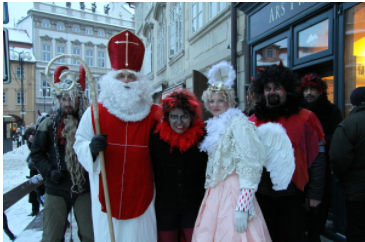When one thinks of a traditional European Christmas, one often conjures images of horse-drawn sleighs, twinkling white lights, scrumptious baked goods, festive markets, and of course a jolly St. Nicholas. In fact, Czechs celebrate the Christmas season throughout the entire month, starting with St. Nicholas Eve on the fifth of December. On this exciting night, children across the country breathlessly await the arrival of St. Nicholas and his two companions - an angel and a devil. The pious old man asks whether the children have been good all year, and may even ask them to sing a song or recite a poem for him. This is followed by gifts of chocolate and fruit (or coal for the unfortunate naughty youngsters). While this tradition is quite well known across the Western world, many are unaware of its Eastern origins. Saint Nicholas, a bishop known for his fabled practice of giving gifts in secret, was actually born in modern-day Turkey. In fact, only about a day’s journey away, this primarily Western tradition is being slowly adopted in Turkey, the so-called bridge between Europe and Asia.
The Czech Republic and Turkey, although both part of the European continent, may seem as close to opposites as you can get; however, the two countries do have some unexpected cultural similarities. While Turkey is a predominantly Muslim country, it is unique in that its founder and first president Mustafa Kemal Atatürk established the republic’s government to be separate from religious influence. Today, modern Turks celebrate the holiday of Noel on December 31st and the arrival of “Noel Baba” (Father Christmas) as he comes to bestow gifts for the New Year. Schoolchildren across the country eagerly anticipate sharing gifts with their classmates, similar to the modern-day White Elephant exchange wherein gifts are exchanged anonymously and not opened until everyone has chosen their mystery present. In the capital city of Istanbul, streets are festooned with garlands and lights, small shops reminiscent of the traditional European markets pop up, and lively parties carry on until the early morning hours throughout the city.
While a Czech Christmas might be a bit more long-standing and traditional, the similarities between these two seemingly polar opposite countries are surprising. Indeed, in today’s often divisive world, it is increasingly important to not solely focus on differences, but instead to seek out commonalities. And, perhaps if we look closely enough, we can discover that humans, no matter where they are from, are not so different after all.
Written by Amanda Kılıçlı



